For the 1936-37 season, Warner Brothers’ cartoons seemed to be going from strength to strength. They were developing a character that was making people forget Bosko and Buddy – a stuttering pig. And Carl W. Stalling had come on board to do the muasical scores, replacing the Bernard Brown – Norman Spencer team. Stalling, whose experiences had included accompanying silent movies, found new ways to use the Warner songs. Stalling would use snatches of these songs as light motifs to accent a character or character trait. These cartoons, in their original black-and-white form or as color redrawns by the “underpaid Koreans”, were seen on television as early as 1955, and had frequent reruns on TV in the years since then.
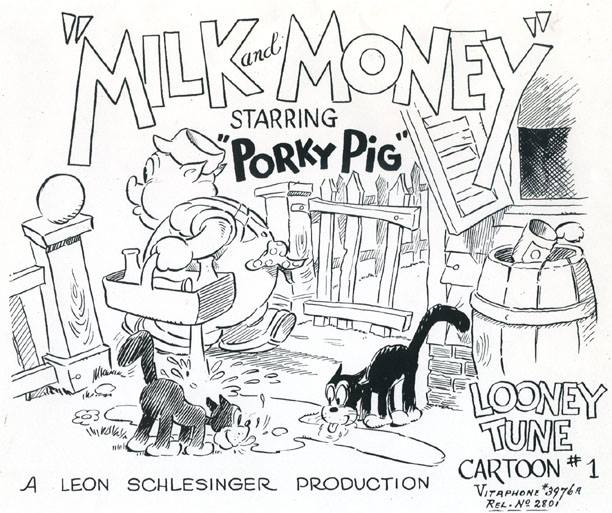
Milk and Money (10/3/36) – In order to try to save his father’s farm, Porky takes the family horse and wagon into town to make some money. They land a job with the “Fuller Water Milk” company, and are warned of the dire consequences of breaking a single bottle. More than one bottle gets broken. Porky then enters the horse in a race and, with the help of a horsefly, wins enough money to save Papa’s farm. Songs heard in the background: mostly old standard favorites, the most recent being “The Gold Diggers’ Song” from “Gold Diggers of 1933″. Other old goodies include “The Old Gray Mare”, and “Pretty Baby”, a 1916 song recorded by Billy Murray for Victor.
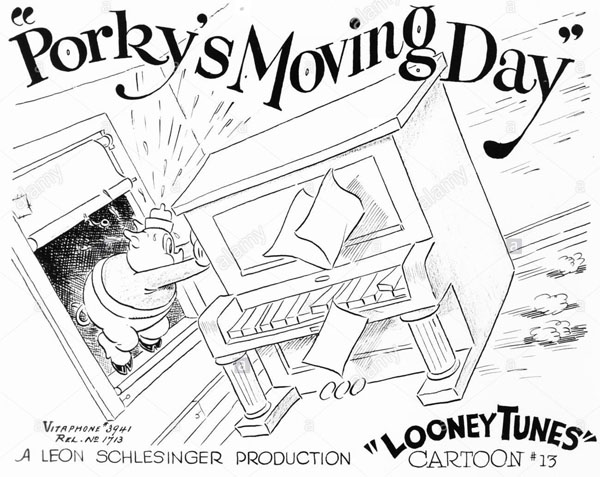
Porky’s Moving Day (10/7/36) – Miss Cud is wanting to move out her house – which is about to move out from under her, thanks to high waves and an unstable cliff. Porky, his pet ostrich Lulu, and a punch-drunk assistant who goes into a fighting stance whenever he hears a bell, take their moving van out to help Miss Cud move her furniture. It turns out not to be that easy – but ultimately the waves sweep Miss Cud’s entire furnishings neatly into the van, down to the last piece. Songs, relegated to the background, include “I’d Love To Take Orders From You”; and an oldie from 1919, “Let the Rest of the World Go By”, recorded in the day by Charles Hart and Elliot Shaw for several labels – no revival recording known concurrent with the time of this cartoon. Here’s a Bob Hannon 1941 recording:
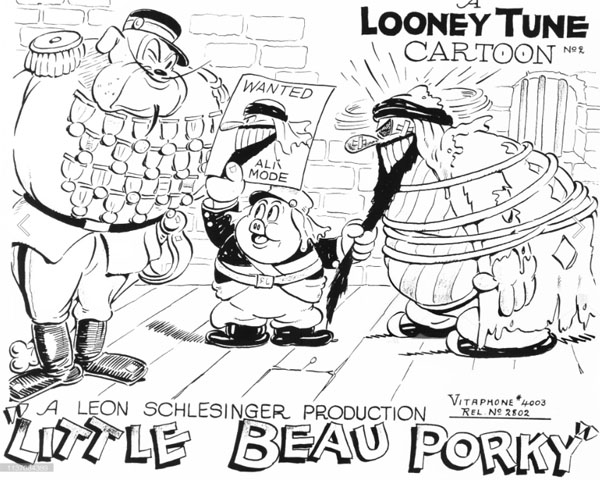
Little Beau Porky (11/14/36) – Porky is in the Foreign Legion, relegated to the role of a “camel scrubber” at the orders of a “jingle bell general” with a chest full of medals (voiced by Billy Bletcher). With the help of the camel and a barrel of “Cairo Syrup”, Porky defends the fort against Ali Mode and his hordes – leading to Porky as the new commandant, with both he and the camel decorated in medals sufficient to match their old commander. Songs: Porky’s motif for happy moods is “The Fella With a Fiddle”, which we will meet again in future posts.
The Village Smithy (12/5/36) – Built more or less around the famous poem, this cartoon features Porky as assistant to a village blacksmith. After some to-do with a rubber horseshoe, Porky sends the blacksmith on a wild ride by hitting a horse attached to a wagon in the flanks with a red-hot horseshoe. Songs: mostly oldies, including “In the Shade of the Old Apple Tree” (1906), “Put On Your Old Gray Bonnet” (1909), and “My Pony Boy” (1909), which would later become the centerpiece for rival Paramount’s Screen Song Heap Hep Injuns, and which was recorded at the time of its writing by Ada Jones for Victor.

Porky In the North Woods (12/19/36) – Porky is taking care of all the animals in a game preseve, who are being trapped by a French-Canadian lumberjack type (a sort of precursor to Black Jacque Shellac), who ignores all the signs protecting the animals. Songs again are mostly oldies, including “Canadian Capers”, written in 1921 and recorded then by Paul Whiteman on Victor, then more recently by Harry Roy on Parlophone (issued in the U.S. on Decca), and later would have a lyric fitted to it and be recorded for a Warner film by Doris Day (sometimes known under the title, “Cuttin’ Capers”). Speaking of Days, we also have “Little Man, You’ve Had a Busy Day”, recorded by a Joe Green group with lots of xylophones and vocal by Frank Luther on Melotone and the dime-store labels, as well as such oldies as “Tramp, Tramp, Tramp”, and an old German melody usually known as “Hi Lee, Hi Lo”.
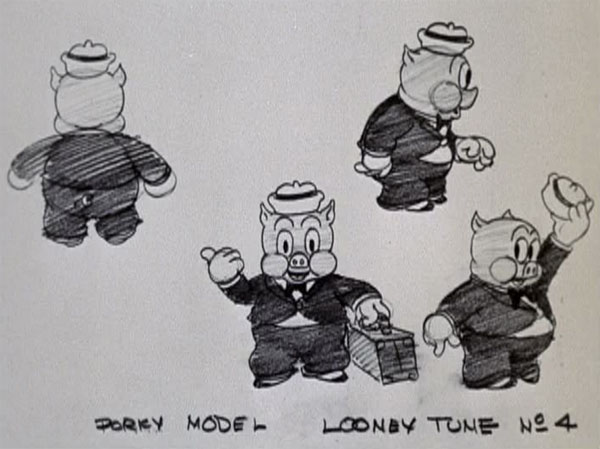
Porky the Wrestler (1/9/37) – Porky is trying to hitch a ride into the city, where a big fight is to take place. He winds up riding in the limousine of the challenger, and, through no fault of his own, finds himself mistakenly in the ring with the “Man Mountain” champion. Porky winds up the winner, and the referee winds up with a hand flatter than a pancake. Songs: an familiar oldie, “Wait for the Wagon” (Judy Canova sang it in Sis Hopkins (1940) below), along with another old standard that would get recurrent use in Warner cartoons, “California, Here I Come” (a 1924 song recorded at its inception by Al Jolson). And, although the musical portion of the recording is not used, we get, “I’se a Muggin’”, a two-part number in which side two of the record consisted of a counting game, recorded by Stuff Smith and his Onyx Club Boys on Vocalion, and by the Teagarden Boys and Trunbauer’s Swing Band on Victor.
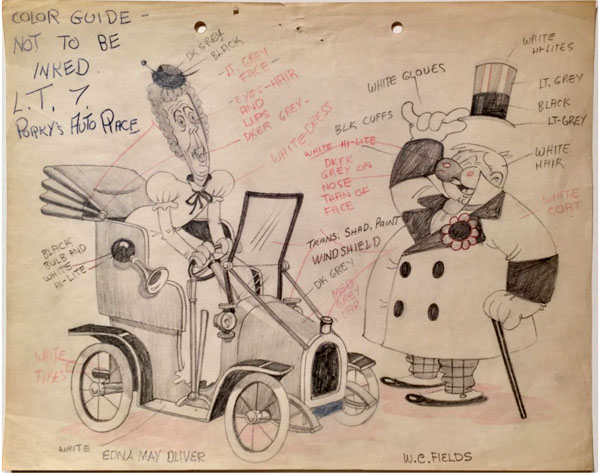
Porky’s Road Race (2/6/37) – Porky enters his little car into a road race full of celebrity caricature drivers. It winds up a match between Porky and Car #13, driven by Borax Karloff. Porky scores the victory, but Edna Mae Oliver makes off with the winner’s crown on her bustle! Songs: “Through the Courtesy of Love”, recorded by Richard Himber and his Essex House Orchestra on Victor, by veteran band leader Ben Pollack on Brunswick, and Tempo King and his Kings of Tempo on Bluebird. There were several British recordings as well. We also get, “In My Merry Oldsmobile”, a 1905 song celebrating the victory of an Oldsmobile in a transcontinental road race, recorded when it was new by various singers including Billy Murray, and recorded in 1927 by Gene Goldkette’s Orchestra featuring Bix Beiderbecke, on a special disc issued for a convention of Oldsmobile dealers. Also, “At Your Service, Madame”, used as a light motif for W.C. Fields, and “Don’t Give Up the Ship”, use to accompany the “Floating Power” engine of Charles Laughton as Captain Bligh. Stephen Foster’s venerable “Old Black Joe” (which we shall meet again in later posts) accompanies Stepin Fetchit’s “knee action special” – a kiddie pedal car.

Picador Porky (2/27/37) – Porky and a couple of fiends decide to invade a bullfight, with Porky attempting to win the prize money by “fighting” his friends in a bull suit. Porky’s friends get “smashed”, providing Mel Blanc with his first work at Warner Brothers with his standard “inebriated” voice. Songs include “La Paloma”, an oldie written by Sebastian Iradier, “La Cucaracha” (which we have met before, using both English and Spanish lyrics, the latter unexpurgated), “Lady of Spain” (a 1931 piece written by Tolchard Evans and recorded by Ray Noble for HMV and released here on Victor with vocal by Al Bowlly), and finally, “The Lady In Red”.

Porky’s Romance (4/3/37) – Porky goes courting Petunia Pig, then has a nightmare about married life with her and all the kids they would produce. Songs include “I Wanna Woo”, encountered previously, a song from late 1935, recorded by Leo Reisman for Brinswock, and in a more swinging version by Joe Haymes on Melotone (below) and the dime-store labels. Also included, “The Little Things You Used To Do”, which will be encountered again in a subsequent article on Merrie Melodies; the old standard, “Oh, You Beautiful Doll”, a 1911 tune which was already the subject of a Max Fleischer Screen Song around 1930; and “Honeymoon Hotel”, which we have met before.

Porky’s Duck Hunt (4/17/37) – Porky takes his dog out for some duck hunting, and meets a “crazy darnfool duck”. Such was the way a new star was born, as the fowl turned out to be none other than Daffy Duck in fledgling form, who would go on to recurring fame in a handful of color Merrie Melodies, and rejoin Porky as a team player for many a black-and-white Looney Tune. Songs: “When My Dreamboat Comes Home”, written by Cliff Friend and Dave Franklin. This song became a go-to cue for Carl Stalling whenever he wanted to suggest characters going to bed or dreaming. Victor had a sweet version by Guy Lombardo and his Royal Canadians. Decca released a Dixieland-flavored version sung by Bing Crosby accompanied by Bob Crosby’s Bobcats. A quintet of drunken fish (with Billy Bletcher taking a line as basso) perform “Moonlight Bay”, a song written in 1911 and performed on records by Billy Murray and the American Quartet for Victor (here it is below, by Doris Day). Also revisited was “She Was an Acrobat’s Daughter”, and such old standard favorites as “A Hunting We Will Go” and the third section (the calm) of Rossini’s William Tell Overture, used as a light motif to suggest dawn in the duck blinds.
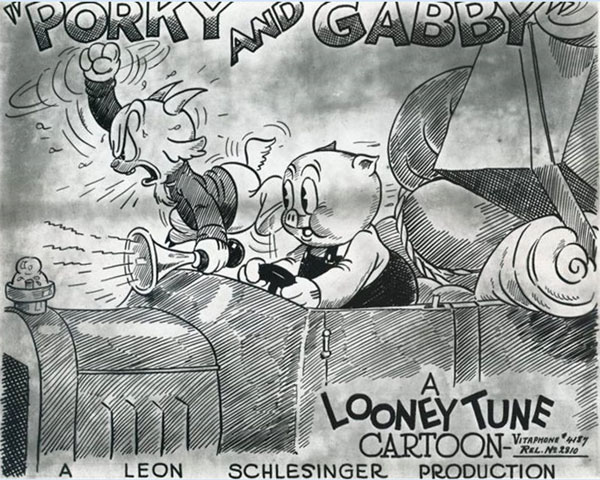
Porky and Gabby (5/15/37). The first of two Porky’s “farmed out” to Ub Iwerks’ studio, with assists provided by Chuck Jones and Bob Clampett, has us camping out with Porky and his obnoxious new co-star, Gabby Goat. The background tracks consist of a good helping of “Speaking of The Weather”, “Black Coffee” and a Stalling favorite from this era, “Gee But You’re Swell”:

Porky’s Building (6/19/37) – Porky and rival contractor Dirty Diggs wind up submitting identical bids for a new city hall. What a break for the city! They stipulate that the first to complete his structure gets the contract, thus getting two city halls for the price of one! With the help of a brick-laying rabbit, Porky wins the contract, while his rival lives down to what his name suggests. Songs include “Let’s Put Our Heads Together” (the sweet ballad from Gold Diggers of 1937), introduced by Dick Powell in the film and also recorded by him for Decca. Vincent Lopez performed it on Melotone, et al. Brunswick gave it to Jimmy Grier’s popular West Coast sweet band, while Vocalion had a “52nd Street” version By Henry Red Allen and a group of all-star musicians. “52nd Street” from the 1937 musical feature of that name, released by United Artists, by Sammy Cahn and Saul Chapin is heard as backdrop in the beginning of the cartoon. Here’s a Louis Prima version:
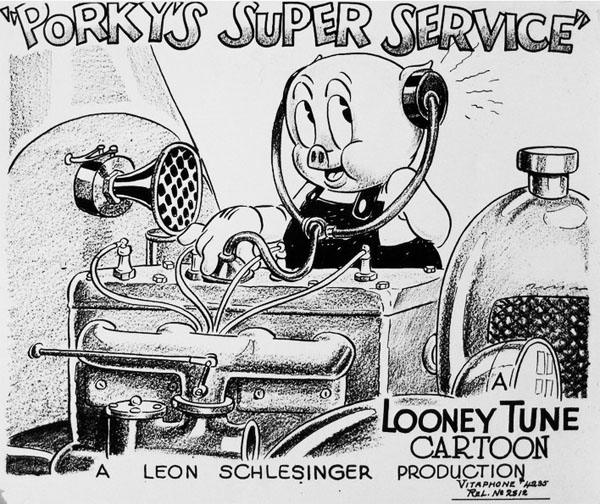
Porky’s Super Service (7/3/37), the second of two Porky’s “farmed out” to Ub Iwerks’ studio, with assists provided by Chuck Jones and Bob Clampett. Very similar to other service station cartoons of the time, but with the inclusion of a spoiled brat kid and a mother who’s oblivious to how mean the “widdle kid” can be to Porky. Songs include, “I’m Hatin’ This Waitin’ Around”, recorded by Kay Kyser on Brunswick, Mike Riley on Decca (below), and Chick Bullock on Melotone et al. Other songs: “My Little Buckaroo” (which will be revisited in connection with a color Merrie Melodie), and “Gee, But You’re Swell”, which Tex Avery would also use in a later Merrie Melodie fairy tale spoof, both to be discussed in later articles.

Porky’s Badtime Story (7/24/37) – The first cartoon directed by Bob Clampett. The premise: Porky and Gabby Goat are frequently late for work at “Peter Piper’s Pickled Peppers”, so the duo try to get a good night’s sleep, in an attempt to be early for a change. But everything conspires against them. Finally when the alarm clock wakes them at 6:00am, they race to the plant, only to find it’s closed for Sunday! Songs include “When My Dreamboat Comes Home”, “How Could You?” (another song that Carl Stalling liked, often given to a caricature of Martha Raye), and “September In the Rain”, which we will encounter again in a forthcoming Merrie Melodie article. Here is Guy Lombardo doing “By The Light Of The Silvery Moon” heard here and often in Looney Tunes to come.

Porky’s Railroad (8/7/37) -Porky is running the 15 1/2 Century Limited – a decrepit old locomotive nicknamed “Toots”. When he and his t“rusty” loco are derided by the engineer of “The Silver Fish” a new streamlined train (he inquires “A percolator on roller skates?”), Porky challenges The Silver Fish to a race. Porky manages to win with the aid of a bull he has antagonized earlier. Watch for the gag in a clearly labeled “Wood Pile”, which was cut out of the color-redrawn version of this short. Recent songs include “Streamlined Greta Green”, which we will meet in a future Merrie Melodies article, and such oldies as “California, Here I Come”, “I’ve Been Working on the Railroad”, “(When They Play) Rural Rhythm”, and “Frankie and Johnny”.
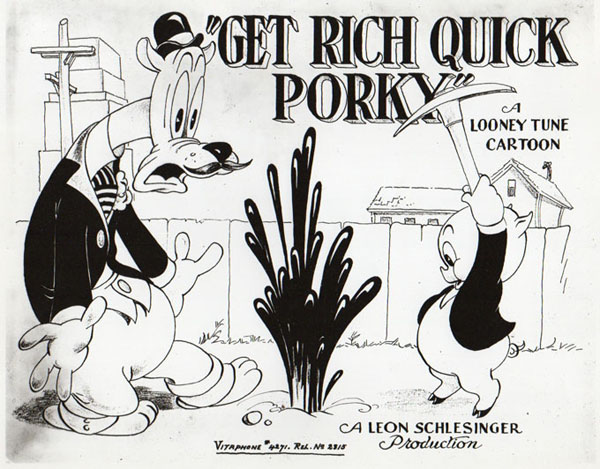
Get Rich Quick Porky (8/28/37) – A wily wolf Weasel is trying to swindle anyone out of money, by selling them land saturated with oil – from a fuel truck and a sprinkler system. However, to his chagrin, “suckers” Porky and Gabby, assisted by a nervy gopher, discover the land is sitting on a real pool of oil. Songs include “When My Dreamboat Comes Home” (wouldn’t anybody dream of oil?), “With Plenty of Money and You”, which we’ll meet again in a Merrie Melodie, and the old-school familiar “I’ve Been Working On the Railroad”.
Next Time: Merrie Melodies 1936-37: More Old Friends


 James Parten has overcome a congenital visual disability to be acknowledged as an expert on the early history of recorded sound. He has a Broadcasting Certificate (Radio Option) from Los Angeles Valley College, class of 1999. He has also been a fan of animated cartoons since childhood.
James Parten has overcome a congenital visual disability to be acknowledged as an expert on the early history of recorded sound. He has a Broadcasting Certificate (Radio Option) from Los Angeles Valley College, class of 1999. He has also been a fan of animated cartoons since childhood.











































I hope your use of the term “light motif” is the result of overactive autocorrection. The word is “Leitmotif” (from the German Leitmotiv, “leading theme”), a musical theme associated with a particular person, place, thing or idea. It was coined in reference to the operas of Wagner, and believe me, there’s nothing “light” about them!
A lot of the songs in “Picador Porky” come from the 1935 WB feature “In Caliente”, covered in your previous post. Stalling would reuse much of this material two decades later in Chuck Jones’s classic bullfighting cartoon, “Bully for Bugs”.
There are several doleful viola solos in these cartoons. In “Milk and Money”, the viola plays “The Old Grey Mare” in a minor key when Porky has lost all hope of his horse winning the race. In “Picador Porky”, the viola gives a lugubrious rendition of Harry Warren’s “Tango Muchacha” when Porky switches the bull with his two hobo friends in a bull costume. In “Porky’s Romance”, the viola plays “The Little Things You Used to Do” during our hero’s suicide attempt; and it plays a slow, sad version of “A-Hunting We Will Go” after “Porky’s Duck Hunt” has ended in failure.
The tone of the viola, less strident than that of the violin or cello, has long been associated with music of mourning; I once compiled a list of over 200 compositions for the viola titled “Elegy” or some variant thereof. Pamela Goldsmith, who has recorded film scores with Hollywood orchestras since the seventies, told me that whenever she is given a viola solo, she knows that, at that particular point in the movie, someone will die.
Stalling’s later viola writing shows greater ingenuity, for example the pensive solos in the Road Runner cartoons where the coyote is trying to work out a problem. “The viola is very good for mysterious effects,” Stalling said in a 1969 interview, and he was right. But it’s good for a lot of other things, too!
Here’s another link for “Canadian Capers”: https://www.youtube.com/watch?v=A3B0odHZcvE , since it contains the second part heard in the running scene and other cartoons such as “His Bitter Half” (skip to 2:34).
So many classic songs in this season. The cartoons were getting better, too- the difference between these shorts and the previous year’s offerings is night and day.
That’s a WEASEL in the last, NOT a Wolf. Get it? A Sneaky WEASEL? 🙂 It also was Gabby’s last, voiced in this one only by Cal Howard//
The first cartoon superstar for Warner Bros.
He’s one of my personal favorites.
Thank you for this!
Wonderful stuff, Mr. Parten.
Apart from the tunes you list, allow me to note the presence of some J. S. Zamecnik silent film scoring cues here and there—most notably “Comedy Excitement” in PORKY’S MOVING DAY: https://www.youtube.com/watch?v=lFLx–Sh3jM&list=OLAK5uy_nLF2eXBWq6OW6Nc-GXSIiPlYNW4EVmwOM&index=12
If you listen to this playlist you’ll encounter other tunes used in the Warner shorts at around this time, including “Defense of Honor,” “Battle Music,” “Treacherous Knave,” and “Queer Antics.” (In all fairness, you may have mentioned some of these in earlier articles, but Google is being weird today, so it’s hard to check…)